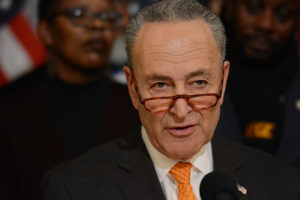Congressional leaders on Sunday unveiled a new bipartisan agreement for fiscal year 2024 spending toplines, to include $886 billion for defense.
The deal adheres to spending levels set by last year’s debt ceiling agreement and sets the path for lawmakers to complete work on final FY ‘24 appropriations bills with a partial government shutdown deadline looming in less than two weeks.

“We now have a framework agreement to allow us to finally begin the hard work of negotiating—and passing—full-year spending bills. We cannot afford to delay further, so I will be working with my colleagues around the clock in the coming days to prevent a needless shutdown and pass bipartisan spending bills free of partisan poison pills that protect key investments and help meet the challenges our constituents are facing,” Sen. Patty Murray (D-Wash.), chair of the Appropriations Committee, said in a statement.
Along with the $886 billion defense topline, Senate Majority Leader Chuck Schumer (D-N.Y.) and House Speaker Mike Johnson’s (R-La.) agreement sets FY ‘24 non-defense spending at $773 billion, which includes $69 billion in priorities discussed as a side agreement during last year’s debt ceiling negotiations.
“The bipartisan funding framework congressional leaders have reached moves us one step closer to preventing a needless government shutdown and protecting important national priorities. It reflects the funding levels that I negotiated with both parties and signed into law last spring. It rejects deep cuts to programs hardworking families count on, and provides a path to passing full-year funding bills that deliver for the American people and are free of any extreme policies,” President Biden said in a statement on Sunday.
Republicans noted the final deal includes $16 billion in offsets to account for the non-defense “side agreement” plus-up, which includes cutting $6.1 billion in unused Covid aid and $10 billion in funds redirected from the IRS.
The House Freedom Caucus, however, has already pushed back on the deal’s inclusion of the additional non-defense priorities and not going far enough with spending cuts, calling the agreement a “total failure.”
.The current two-step, or “laddered,” continuing resolution is temporarily funding a handful of agencies and programs, such as those covered by Military Construction-VA, Agriculture, Energy-Water and Transportation-HUD spending bills, until Jan. 19 and all remaining agencies and programs, to include defense, until Feb. 2.
The House in late September passed its defense spending legislation, which received strong opposition from Democrats over its nearly $2 billion cut to multi-year procurement for select munitions and the inclusion of a slew of GOP-led proposals they’ve criticized as “poison pills” and “needlessly divisive” (Defense Daily, Sept. 29 2023).
The Senate has yet to pass FY ‘24 defense funding, while the Appropriations Committee advanced a version of the legislation this past July (Defense Daily, July 27 2023).